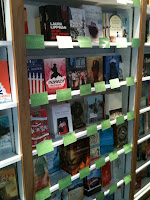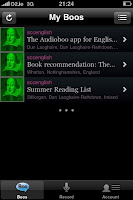 It's a good time to wander around the city drinking coffee and hanging out in good bookshops, so here's the first of some occasional posts about independent and 'small' bookshops in Dublin. It's not an easy time for such shops, competing with internet sellers and the gathering success of e-books (the coming new Kindle looks as if it might be a big seller), and we'd like to highlight some of the best 'local' shops.
It's a good time to wander around the city drinking coffee and hanging out in good bookshops, so here's the first of some occasional posts about independent and 'small' bookshops in Dublin. It's not an easy time for such shops, competing with internet sellers and the gathering success of e-books (the coming new Kindle looks as if it might be a big seller), and we'd like to highlight some of the best 'local' shops.The Gutter Bookshop opened last November, but we've only just visited. It's in Cow's Lane in Dublin city centre, and you might be thinking ... cows, gutters ... doesn't sound very attractive, but actually it's a delight (the name coming from Oscar Wilde's famous epigram 'We are all in the gutter, but some of us are looking at the stars'). Attractively designed on a corner site, with plenty of airy space behind big windows, it features excellently presented shelves and a lovely grey floor (covered with mock grass in the children's area).
Most importantly: the book selection is excellent. Pictured is the staff recommendation section, among which we spotted some books which we've reviewed here, such as Helen Garner's emotionally tough short novel The Spare Room (also in our own summer recommendation list) and Joshua Ferris's second person plural comic novel Then We Came to the End. The teen fiction section is smallish but again well-chosen.
One sign of a good bookshop is discovering an interesting and unusual book: in New Books was The Hare with Amber Eyes, by Edmund de Waal, about his inheritance of Japanese netsuke and their history (hear him in a recent Guardian podcast). We headed off with a copy of Adam Foulds's The Quickening Maze (about the poet John Clare), and across the way to the delicious Queen of Tarts to start reading...


